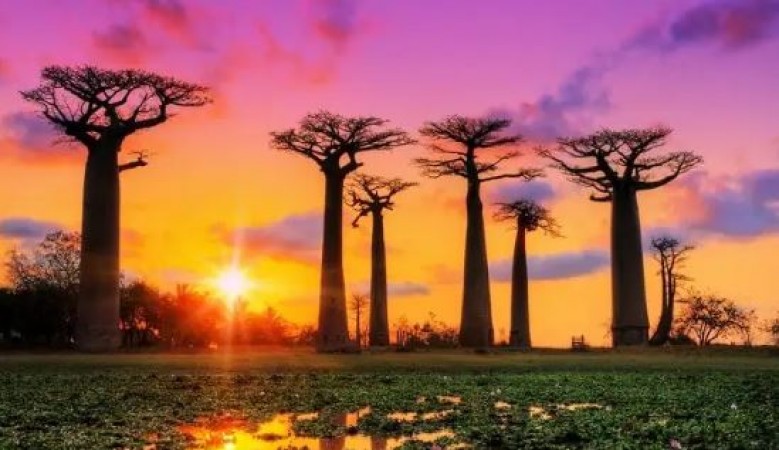
Madagascar, an island nation nestled in the southwestern region of the Indian Ocean, stands as a true wonder of nature and culture. Often referred to as the "eighth continent," Madagascar's unique biodiversity, stunning landscapes, and rich cultural heritage make it a captivating destination for travelers and researchers alike. With over 700,000 years of isolation, this island boasts an array of extraordinary plant and animal species found nowhere else on Earth. This article delves into the enchanting allure of Madagascar, highlighting its unparalleled ecological significance and vibrant cultural tapestry.
Covering an area of approximately 587,000 square kilometers, Madagascar is the world's fourth-largest island, boasting a diverse range of landscapes. From lush rainforests and highland plateaus to arid deserts and pristine coastlines, the country's topography mesmerizes visitors. Madagascar's geographical isolation gave rise to its remarkable biodiversity, which is unlike any other place on the planet.
Unique Flora and Fauna : The island is a hotbed of endemic flora and fauna, hosting a staggering number of plant and animal species found nowhere else. Madagascar is home to over 90% of the world's lemur species, including the charismatic ring-tailed lemur and the elusive indri, known for its haunting calls. The island also shelters a myriad of chameleons, colorful frogs, and the iconic baobab trees, which are native to the region and have become symbols of Madagascar's natural heritage.
Challenges to Biodiversity Conservation : Despite its ecological significance, Madagascar faces significant challenges in preserving its unique biodiversity. Deforestation, driven by agriculture, logging, and mining, threatens the natural habitats of many endemic species. Illegal wildlife trade and climate change further exacerbate the situation. Conservation efforts are underway, with the government and various organizations working together to protect Madagascar's precious flora and fauna.
Cultural Melting Pot : Beyond its ecological wonders, Madagascar offers a rich cultural experience that reflects the island's diverse history and heritage. The Malagasy people, comprising numerous ethnic groups, exhibit a remarkable mix of African, Asian, and European influences. Traditions, customs, and beliefs are deeply rooted in everyday life, celebrated through vibrant festivals and rituals.
Traditional Arts and Crafts : The skilled artisans of Madagascar craft unique handicrafts that showcase the country's cultural identity. Intricate woodcarvings, exquisite textiles, and handmade jewelry reflect the creativity and craftsmanship of the Malagasy people. Tourists visiting local markets can immerse themselves in this artistic expression and bring home one-of-a-kind souvenirs.
ALSO READ: Oklahoma City National Memorial and Museum: A Tribute to Resilience and Remembrance
Music and Dance : Music and dance hold a special place in Malagasy culture. Each region of the island has its distinct musical style and instruments. The "hira gasy" performances, featuring traditional music and storytelling, captivate audiences with their infectious rhythm and heartfelt narratives.
ALSO READ: Top Volcanoes to Explore
Culinary Delights : Malagasy cuisine is a delightful fusion of flavors influenced by the island's diverse history. Rice, considered the staple food, is often served with a variety of meats, seafood, and vegetables. The aromatic blend of spices in many dishes showcases the country's strong ties to its Asian roots. Madagascar's unique ecological and cultural offerings have made it a popular destination for eco-tourists and adventure seekers. However, the rapid growth of tourism also poses challenges to the country's fragile ecosystems and traditional ways of life. Sustainable tourism practices are essential to balance the benefits of tourism with environmental conservation and cultural preservation.
Conclusion : Madagascar, with its unparalleled biodiversity and rich cultural heritage, remains a remarkable gem in the Indian Ocean. As visitors explore its diverse landscapes and experience the warmth of Malagasy hospitality, they cannot help but appreciate the need to protect and preserve this enchanting island for generations to come. By promoting sustainable practices and fostering environmental stewardship, Madagascar can continue to enchant and inspire the world for years to come. Madagascar's ecological and cultural uniqueness makes it an extraordinary destination that captivates the hearts of those who venture to explore its diverse landscapes and embrace its rich heritage.
While the island faces environmental and socioeconomic challenges, ongoing conservation efforts, sustainable tourism practices, and socio-economic development initiatives demonstrate the commitment of the Malagasy people and the international community to safeguarding this ecological gem of the Indian Ocean. As Madagascar continues to find a delicate balance between preserving its natural wonders and promoting sustainable development, it serves as a poignant reminder of the value of protecting our planet's biodiversity and cultural diversity for future generations to cherish and appreciate.
Turkey: A Cultural Tapestry and Geopolitical Crossroads
Culinary Journey through the Best Indian Restaurants in the USA
Top Tropical Paradises for Relaxation